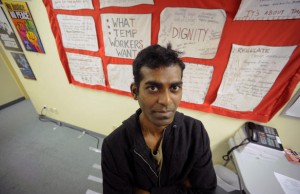Foreign workers uniting to seek better treatment
Nicholas Keung, Toronto Star, May 29 2011
Foreign farm workers, nannies and other temporary labourers in Canada are forming a united front to fight for better treatment by employers “What we are seeing now is a shift and expansion of the temporary foreign workers program from agriculture and live-in care to food industry, restaurants, hospitality and tourism,†said Sonia Singh of the Migrant Workers Alliance for Change, the coalition to be launched this week.
“We are seeing worsening work conditions for these workers. It sets a dangerous path to have our immigration policy based on temporary work.â€
Despite the recent economic downturn, the number of temporary foreign workers in Canada has skyrocketed from 160,908 in 2006 to 283,096 in 2010.
Individual groups have organized within their own sectors, but it is time to have a united front to advocate for all foreign workers, who are at the mercy of Canadian employers and third-party recruiters, said Singh, whose group is made up of 17 grassroots organizations and unions.
Senthil Thevar, who was recruited from India in 2008 to work as a cook in Toronto, was afraid to complain about his bosses because his legal status here was tied to his employers — a reason advocates call the foreign worker program “indentured slavery.â€
On documents submitted for government approval, Thevar, 35, was promised $18 an hour by his first employer, and $15 by the second. In reality, he was paid less than the $10.25 minimum wage, factoring in the 11- to 12-hour days he put in at $2,000 a month.
“The contract is just a formality,†said the Mumbai native, who got his permanent resident status last summer based on his Canadian work experience and employment.
That’s when he approached his employer for fair wages. He said he left the job in April after failing to recoup the money.
The federal government has repeatedly passed the buck of labour protection to the provinces.
Although Ontario has passed new laws to better protect foreign workers, Singh said the protection is limited to live-in caregivers, whose plight was highlighted in a Star investigative series that prompted the changes.
In 2008, Kyla, who asked her full name not be used, paid $5,000 to an agent in the Philippines with a Canadian recruiter for a job at a vegetable packaging company.
Her name was taken off the employer’s contract with the foreign workers after she refused to pay the recruiter another $1,500 to renew her job and work permit.
“That’s a lot of money. Some people are still paying after two years. I called the (provincial) hotline and they told me it was for nannies’ complaints only,†said Kyla, who later found another job with the help of a Windsor legal clinic.
Among the new alliance’s priorities:
• A right to permanent status granted to migrant workers upon arrival.
• Access to all social programs including employment insurance and settlement services.
• Full protection under the Ontario Employment Standards Act and regulations.
Whereabouts of foreign workers in Ontario in 2010
Toronto: 50,020
Ottawa-Gatineau (Ontario part): 4,631
Hamilton: 2,142
London: 1,581
Kitchener: 1,468
St. Catharines-Niagara: 989
Windsor: 671
Oshawa: 646
Guelph: 561
Leamington: 374
Greater Sudbury: 323
Sarnia: 281
Barrie: 279
Kingston: 229
Norfolk: 217
Other parts: 35,062
Total: 99,474
Source: Citizenship and Immigration Canada




